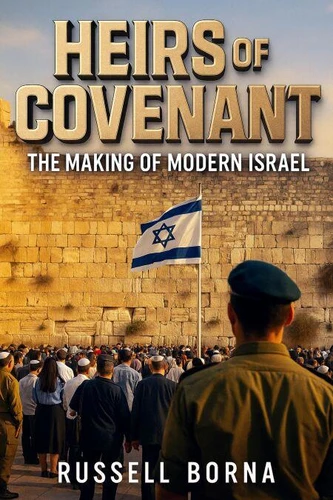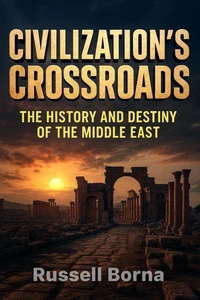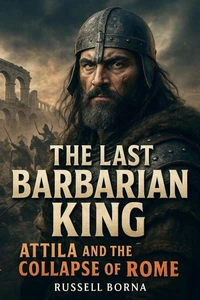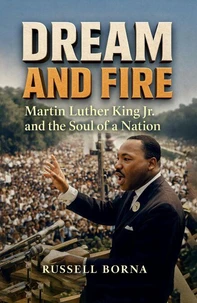Nouveauté
Heirs of the Covenant: The Making of Modern Israel
Par :Formats :
Disponible dans votre compte client Decitre ou Furet du Nord dès validation de votre commande. Le format ePub est :
- Compatible avec une lecture sur My Vivlio (smartphone, tablette, ordinateur)
- Compatible avec une lecture sur liseuses Vivlio
- Pour les liseuses autres que Vivlio, vous devez utiliser le logiciel Adobe Digital Edition. Non compatible avec la lecture sur les liseuses Kindle, Remarkable et Sony
 , qui est-ce ?
, qui est-ce ?Notre partenaire de plateforme de lecture numérique où vous retrouverez l'ensemble de vos ebooks gratuitement
Pour en savoir plus sur nos ebooks, consultez notre aide en ligne ici
- FormatePub
- ISBN8232678746
- EAN9798232678746
- Date de parution25/10/2025
- Protection num.pas de protection
- Infos supplémentairesepub
- ÉditeurHamza elmir
Résumé
{Heirs of the Covenant: The Making of Modern Israel} is a sweeping, unflinching exploration of faith, memory, and power in one of the world's most contested lands. From the biblical promise to the modern state, it traces how an ancient covenant transformed into a geopolitical claim - and how a dream of return became a machinery of displacement. Drawing upon history, theology, and first-hand accounts, the book reveals how myths hardened into ideologies, and how the past continues to wage war against the present.
This is not a triumphalist story of nation-building, but a reckoning with the costs of survival. Beginning with the prophetic journey of Abraham and the earliest Canaanite civilizations, it follows the long arc of Jewish exile, persecution, and return - from the Diaspora and the Holocaust to the Balfour Declaration, the Nakba, and the wars that shaped the Middle East. Each chapter uncovers the intertwining of divine narrative and human ambition, where scripture became strategy and memory became territory.
The book confronts the paradox of Zionism: the transformation of a people's trauma into a state's doctrine of strength. It examines the evolution of resistance - from the First Intifada's stones to the rockets of Gaza - and the ways in which walls, settlements, and checkpoints replaced dialogue. It exposes the uneasy partnerships of intelligence, diplomacy, and faith that underpin the Abraham Accords and the shifting alliances of the 21st century.
Through the lens of both Israelis and Palestinians, Heirs of the Covenant exposes the moral fractures that define this enduring conflict. The narrative brings to life forgotten massacres, manipulated maps, and the silent suffering of millions, while also portraying the voices of those who still believe in coexistence despite endless betrayal. It captures how the politics of security replaced the language of peace, and how normalization without justice has redrawn the moral map of the Middle East.
At its heart, this is a story about humanity's oldest struggle - between belonging and exile, faith and doubt, power and conscience. Written with haunting realism and historical precision, {Heirs of the Covenant} dismantles the myth of inevitability surrounding Israel's rise, revealing instead a story written in contradiction: liberation for some, dispossession for others. It is both an elegy and a warning - a meditation on how nations remember, how they forget, and how the same covenant that once promised redemption continues to divide those who claim it.
For readers of history, geopolitics, and moral philosophy, this book is an invitation to confront the question that still haunts the Holy Land: can any people truly be free when their freedom rests upon another's captivity?
This is not a triumphalist story of nation-building, but a reckoning with the costs of survival. Beginning with the prophetic journey of Abraham and the earliest Canaanite civilizations, it follows the long arc of Jewish exile, persecution, and return - from the Diaspora and the Holocaust to the Balfour Declaration, the Nakba, and the wars that shaped the Middle East. Each chapter uncovers the intertwining of divine narrative and human ambition, where scripture became strategy and memory became territory.
The book confronts the paradox of Zionism: the transformation of a people's trauma into a state's doctrine of strength. It examines the evolution of resistance - from the First Intifada's stones to the rockets of Gaza - and the ways in which walls, settlements, and checkpoints replaced dialogue. It exposes the uneasy partnerships of intelligence, diplomacy, and faith that underpin the Abraham Accords and the shifting alliances of the 21st century.
Through the lens of both Israelis and Palestinians, Heirs of the Covenant exposes the moral fractures that define this enduring conflict. The narrative brings to life forgotten massacres, manipulated maps, and the silent suffering of millions, while also portraying the voices of those who still believe in coexistence despite endless betrayal. It captures how the politics of security replaced the language of peace, and how normalization without justice has redrawn the moral map of the Middle East.
At its heart, this is a story about humanity's oldest struggle - between belonging and exile, faith and doubt, power and conscience. Written with haunting realism and historical precision, {Heirs of the Covenant} dismantles the myth of inevitability surrounding Israel's rise, revealing instead a story written in contradiction: liberation for some, dispossession for others. It is both an elegy and a warning - a meditation on how nations remember, how they forget, and how the same covenant that once promised redemption continues to divide those who claim it.
For readers of history, geopolitics, and moral philosophy, this book is an invitation to confront the question that still haunts the Holy Land: can any people truly be free when their freedom rests upon another's captivity?
{Heirs of the Covenant: The Making of Modern Israel} is a sweeping, unflinching exploration of faith, memory, and power in one of the world's most contested lands. From the biblical promise to the modern state, it traces how an ancient covenant transformed into a geopolitical claim - and how a dream of return became a machinery of displacement. Drawing upon history, theology, and first-hand accounts, the book reveals how myths hardened into ideologies, and how the past continues to wage war against the present.
This is not a triumphalist story of nation-building, but a reckoning with the costs of survival. Beginning with the prophetic journey of Abraham and the earliest Canaanite civilizations, it follows the long arc of Jewish exile, persecution, and return - from the Diaspora and the Holocaust to the Balfour Declaration, the Nakba, and the wars that shaped the Middle East. Each chapter uncovers the intertwining of divine narrative and human ambition, where scripture became strategy and memory became territory.
The book confronts the paradox of Zionism: the transformation of a people's trauma into a state's doctrine of strength. It examines the evolution of resistance - from the First Intifada's stones to the rockets of Gaza - and the ways in which walls, settlements, and checkpoints replaced dialogue. It exposes the uneasy partnerships of intelligence, diplomacy, and faith that underpin the Abraham Accords and the shifting alliances of the 21st century.
Through the lens of both Israelis and Palestinians, Heirs of the Covenant exposes the moral fractures that define this enduring conflict. The narrative brings to life forgotten massacres, manipulated maps, and the silent suffering of millions, while also portraying the voices of those who still believe in coexistence despite endless betrayal. It captures how the politics of security replaced the language of peace, and how normalization without justice has redrawn the moral map of the Middle East.
At its heart, this is a story about humanity's oldest struggle - between belonging and exile, faith and doubt, power and conscience. Written with haunting realism and historical precision, {Heirs of the Covenant} dismantles the myth of inevitability surrounding Israel's rise, revealing instead a story written in contradiction: liberation for some, dispossession for others. It is both an elegy and a warning - a meditation on how nations remember, how they forget, and how the same covenant that once promised redemption continues to divide those who claim it.
For readers of history, geopolitics, and moral philosophy, this book is an invitation to confront the question that still haunts the Holy Land: can any people truly be free when their freedom rests upon another's captivity?
This is not a triumphalist story of nation-building, but a reckoning with the costs of survival. Beginning with the prophetic journey of Abraham and the earliest Canaanite civilizations, it follows the long arc of Jewish exile, persecution, and return - from the Diaspora and the Holocaust to the Balfour Declaration, the Nakba, and the wars that shaped the Middle East. Each chapter uncovers the intertwining of divine narrative and human ambition, where scripture became strategy and memory became territory.
The book confronts the paradox of Zionism: the transformation of a people's trauma into a state's doctrine of strength. It examines the evolution of resistance - from the First Intifada's stones to the rockets of Gaza - and the ways in which walls, settlements, and checkpoints replaced dialogue. It exposes the uneasy partnerships of intelligence, diplomacy, and faith that underpin the Abraham Accords and the shifting alliances of the 21st century.
Through the lens of both Israelis and Palestinians, Heirs of the Covenant exposes the moral fractures that define this enduring conflict. The narrative brings to life forgotten massacres, manipulated maps, and the silent suffering of millions, while also portraying the voices of those who still believe in coexistence despite endless betrayal. It captures how the politics of security replaced the language of peace, and how normalization without justice has redrawn the moral map of the Middle East.
At its heart, this is a story about humanity's oldest struggle - between belonging and exile, faith and doubt, power and conscience. Written with haunting realism and historical precision, {Heirs of the Covenant} dismantles the myth of inevitability surrounding Israel's rise, revealing instead a story written in contradiction: liberation for some, dispossession for others. It is both an elegy and a warning - a meditation on how nations remember, how they forget, and how the same covenant that once promised redemption continues to divide those who claim it.
For readers of history, geopolitics, and moral philosophy, this book is an invitation to confront the question that still haunts the Holy Land: can any people truly be free when their freedom rests upon another's captivity?






















